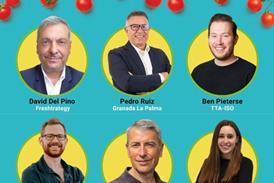Meldungen aus Europa – Page 4655
-
Article
Labour pressure on for NZ apples
The New Zealand apple harvest is due to start next week with Royal Gala, but pressure for seasonal labour is mounting.
-
Article
Pesticides code unveiled
Defra has published a new statutory code of practice for users of plant protection products this week.
-
 Article
ArticleFirst arrivals from Cape
The first volumes of 2006 Cape Royal Gala apples arrived in the Port of Sheerness on February 14, aboard the vessel the Snow Crystal.
-
 Article
ArticleGlobal food safety update
Chris Anstey, product integrity manager at Tesco, gave delegates at the CIES Food Business Forum’s Food Safety conference in Paris an update on the work of the Global Food Safety Initiative (GFSI).
-
Article
Packaging website solution
Arlington Packaging has launched a new website to attract customers looking for a returnable packaging solution.
-
Article
Made in Blu expansion
Italian co-operatives and exporters are banding together to increase their presence and standing on export markets.
-
 Article
ArticleFlorida facing cold snap
Florida fruit and vegetable growers are taking steps to prevent the state’s recent cold snap from affecting crops.
-
 Article
ArticleSouth Tyrol apples get a rebrand
The South Tyrolean Apple Consortium has announced a protected geographical indicator (PGI) label for its fruit and total image rebranding.
-
 Article
ArticleEat in Colour up and running
Contrary to fears of its early demise, industry leaders have given the Fresh Produce Consortium’s Eat in Colour campaign the thumbs up, despite it failing to hit its initial fundraising targets.
-
Article
EurepGAP to hold new training workshops
EurepGAP, the global partnership for safe and sustainable agriculture, is holding a “Train-the-Trainer” workshop to present the structure and documentation needed to successfully implement the EurepGAP framework for Integrated Farm Assurance.
-
 Article
ArticleCooking with Bramley
Supporters are expecting big results from this year’s fifteenth Bramley Apple Week. Doris Lee Butterworth reports.
-
 Article
ArticleScience going global
Innovation, added value and being consumer-led are all vital in the fresh produce sector and are frequently cited by companies in these pages as what keeps them ahead of the game. But behind the buzz words are hundreds of projects taking place around the world as part of a global network of research and development. English-speaking countries are well placed to benefit with English the international language of science. Kathy Hammond looks at the internationalisation of R&D in horticulture and fresh produce.
-
 Article
ArticleTurners’ critical mass
After five years of existence in the realm of consolidation and packing, Turners PPL is ready to up its game. Elspeth Waters visited the Newmarket site to see how the company’s latest developments are shaping up.
-
Article
Spar goes far on healthy messages
The international retailer group, Spar, recognises the importance of the food industry’s involvement in raising
-
Article
Answering the tricky questions
So all’s well that end’s well ...or is it?This week, nearly five months after issuing a clarion call to the
-
Article
Will competition bosses listen?
Politicians are warning that the dominance of the big retailers will force smaller independent traders off the high street by
-
 Article
ArticleHigh Priest of Tomatoes wins prize
Israel’s “High Priest of Tomatoes” Professor Nachum Kedar, of the Hebrew University of Jerusalem's Faculty of Agriculture in Rehovot, is the recipient of the 2006 Israel Prize in Agriculture.
-
 Article
ArticleCapespan expands its brand
Capespan is expanding the range of fruit marketed under its corporate brand in line with a commitment to developing a range of sources and increasing choices for wholesale customers.
-
 Article
ArticleGrowers back call for retail clampdown
NFU president Tim Bennett has called for action to eradicate the climate of “fear and oppression” characterising the relationship between growers and their retail customers.
-
 Article
ArticleBacteria key to drought solution
Bacteria may be able to keep some plants growing through short periods of drought and save valuable crops from being lost, scientists claimed.


